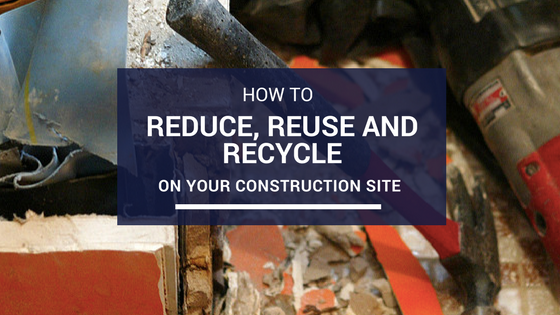Even though the majority Americans are dedicated to “3 R’s” in their personal lives, some construction companies could do a better job.
And, no, although “reading, ‘riting, and ‘rithmatic” are as vital on the job as they are at home, those aren’t the “3 R’s” we’re talking about here.

Reduce, Reuse and Recycle
Environmental consciousness should be as vital to American business as it is on the home front. Unfortunately, construction contributes a huge amount of waste to the country’s landfills each year. It is estimated that every new home construction project generates as much as 8,000 pounds of trash.
Globs of concrete, nails and screws, cut lumber, packaging materials, electrical wire, PVC, plywood, shingles, insulation, copper tubing, sheathing, globs of concrete, glue and paint, rags, bricks and tile — the list is almost endless — and it all eventually makes its way to a landfill if it’s simply piled into a dumpster.
What is there to do about it? Here are 7 good tips:
- Become aware, take action and get organized. There are organizations in every city that will pick up and reuse or resell building materials. Check out the options in your area: Habitat for Humanity, thrift stores, homeless shelters and job-training programs are just a few of the possibilities.
- Take charge of your ordering and buying. Take stock of what’s left over during each phase of construction and adjust your ordering. By the same token, if you find it necessary to make frequent trips to the lumber yard or the hardware store during construction, try to become more efficient with your estimating.
- Plan an organized onsite area to corral unused materials. Build racks for plywood, rigid insulation, lengths of PVC, sheathing, tiles and shingles. Return full boxes of any supplies, or save them for the next job. Invest in tarps so materials aren’t damaged by weather. Call for pickup or plan for removal by professional recycling companies.
- Build efficiency into every aspect of your job. Ensure that materials aren’t damaged or wasted through improper measuring or careless installation. Plan your cuts and uses to maximize every stud, length of wire and piece of pipe. Create a “what-not” box if you can. You might be able to eliminate last minute trips to the hardware store!
- Care for your equipment. Some of the greatest time and money robbers on any construction site are tools that break or go missing; many of them wind up in the trash. Encourage your workers to properly clean their trowels and paintbrushes, and take care of their measuring tapes, levels, hammers and screwdrivers. It’s well worth the effort to ensure longevity — and to keep them out of the trash can.
- Mistakes happen. But there could be a problem if the same mistakes keep happening. “Measure twice, cut once” is still good advice. But extend that philosophy to all aspects of the job. Again, it’s a way to reduce trash as well as a way to boost efficiency.
- Finally, think creatively. Recycled materials and reclaimed timbers are extremely popular with today’s homebuyers. Adopt the philosophy that what you don’t use on a particular job may just become a prized feature of another home!
Okay, it’s not likely that a stud or a piece of plywood will be a thing of beauty in anyone’s home; but such common building materials might just help provide a home for someone. And who’s to say that a discarded light fixture, a box of tile, or a roll of roofing felt might not be exactly what someone else needs?
At the very least, take comfort in the fact that you’ve helped lighten the load at the landfill. Whatever you do to promote the concept of “reduce, reuse and recycle” is good for the environment.
And that’s good for us all.


